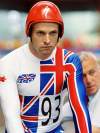Eye For Film >> Movies >> The Flying Scotsman (2006) Film Review
At a time when professional cycling has sunk to an all time low following this year's Tour De France doping fiasco, it's refreshing to note the more gratifying aspects of a noble working man's sport that once upon a time made heroes out of the ordinary.
Graeme Obree is a man of modesty, and would be the first to describe his achievements in life as ordinary. But his ascension from working-class poverty in Ayrshire to the dizzy heights of a double world hour cycling championship and his parallel descent into mental hell, are far from mainstream.

Obree's story is remarkable given his roots and background. Naturally thrifty and resourceful as a result of his dire financial situation in bike sales, he attempted to revolutionise the world of cycling with his theories on how to make aerodynamics workable. Who cares indeed! But when you see him dismantling his washing machine to find parts to custom build his "old faithful" bike next to his arch rival Chris Boardman's £500,000 bike project, this is a true case of art's triumph over science.
In 1993 Obree broke the great Italian cyclist Francesco Moser's hour record in the Hamar Velodrome in Norway, using a replica of a homemade bike and a brand new tuck position used to cut through the air more effectively. A tremendous feat and a monumental celebration for an amateur club rider, the World Cycling Federation did their best to denigrate his achievements and in 1995 after his second record, tried to strip him of his title. This was the least of Obree's worries in light of his mental instability, but Mackinnon has elected to highlight the achievements of Obree in the face of a conservative cycling establishment. This he does brilliantly.
The dark side of Obree's character is featured to a lesser extent, and this is where Mackinnon lets himself down. Although he makes clear Obree's manic depressive mood swings stemming from an alienated childhood, he doesn't go far enough, and certainly doesn't tie them together with Obree's family and community peers. His wife Anne (Laura Fraser) has a grossly underwritten part, and while her support for Graeme is evident, the real life difficulties are not obvious enough. Life was at times hell for her, as she tried to keep her husband on the straight and narrow, but this is glossed over. There is no mention of the death of Obree's brother in 1994, or the several botched suicide attempts. The hanging attempt in the woods is awkwardly dealt with.
Miller's performance is decent, though. Although at times a touch wooden in delivery, his brief attempts to get under the skin of Obree's dark side are commendable. Brian Cox turns in a good performance as a widowed minister who helps Obree in his times of trouble, but Billy Boyd is hopelessly miscast as the ubiquitous chirpy happy-go-lucky friend who, through no fault of his own, does nothing for the cause.
Mackinnon has made a good stab at an ambitious project. Making a highly specialised sport accessible is difficult, but Obree's profile is the perfect human vehicle to make such a thing happen. If appearing overly sanitised to non cycling fans, Mackinnon obviously had the widest possible audience in mind. To cycling fans, Obree is a flawed legend who personifies the virtues of the true spirit of cycling and they probably won't care.
Reviewed on: 07 Sep 2006





















